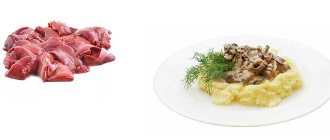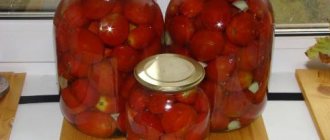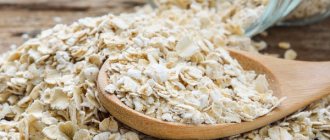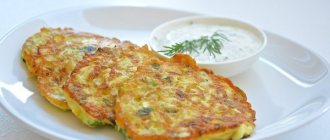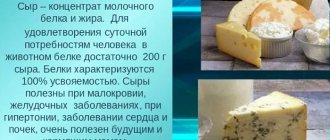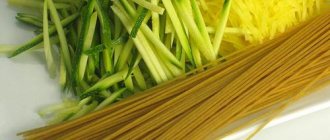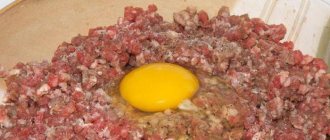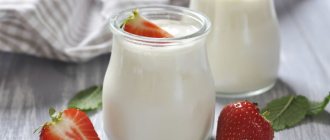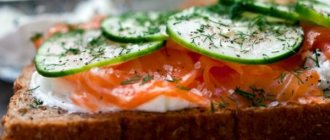Different foods have different energy values. For those who are losing weight, it is important to know the calorie content of food in order to correctly create a menu for the day in accordance with their needs. For an overweight adult, you need to reduce your calorie intake by 500 calories per day compared to your usual diet in order to start losing weight. Many nutritionists recommend increasing your consumption of vegetables, as they are relatively high in fiber, vitamins and minerals, but low in calories. In this article we will discuss the calorie content of zucchini and various dishes made from this vegetable.
Chemical composition
The benefits for the body are not only the low calorie content of zucchini per 100 grams, although this is precisely due to the 93% water content in the vegetable.
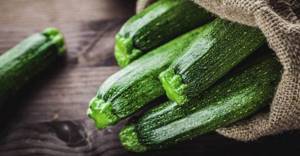
In addition to it, the fruits are full of fiber, mineral salts, organic acids and vitamins, and most importantly, everything is in the most balanced composition, which is considered beneficial for the body. The product contains:
- 4.6 g di- and monosaccharides;
- 1 g dietary fiber;
- fatty acids 2 g;
- 400 mg ash.
Zucchini is the main source of potassium, ascorbic acid and vitamin B6 for humans. In addition, it contains sodium, calcium, iron, magnesium, phosphorus, vitamins E, PP, A, H, B1, B2, B5 and B9.
The use of zucchini in dietetics, for weight loss
Due to the high content of dietary fiber and fiber, zucchini contributes to the normal course of metabolic processes in the body, cleanses it of toxins, normalizes the functioning of the gastrointestinal tract, and prevents obesity. These properties of the product make it dietary. Its use is recommended by doctors and nutritionists.
When losing weight, the vegetable is used as a main product for fasting days or in the form of a special diet. It goes well with many other products. A variety of nutritious zucchini dishes allows you to make your diet not only healthy, but also tasty. Zucchini is used boiled, baked or stewed.
Benefits of vegetables
The low calorie content of zucchini is their main advantage in dietary nutrition, but not the only one. The fruits of the plant are often used for stool disorders, since eating them can help with constipation without causing diarrhea.
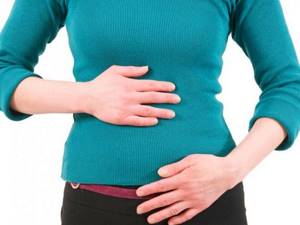
In addition, zucchini reduces cholesterol levels, helps relieve swelling, improves the functioning of the genitourinary system, activates hematopoiesis and improves blood quality. The ideal ratio of sodium and potassium 1:150 helps normalize water balance. Experts recommend using zucchini as an additional therapy for cholecystitis, colitis, hypertension, diabetes and hepatitis.
It is known that zucchini fruits have a beneficial effect on the nervous system and prevent the development of atherosclerosis.
By preparing a decoction from the flowers of the plant, dermatological diseases can also be treated.
Current GOST for fresh zucchini
To determine the quality and safety of fresh zucchini before sale, they rely on the current GOST. These requirements apply to vegetables of cultivated varieties that are collected at the stage of technical maturity. Particular attention is paid to such indicators as appearance, smell, taste, and internal structure of the pulp.
The fruits must be whole, fresh, healthy, clean, with thin skin and stalk, and have a typical shape and color for the variety. Mechanical damage, signs of disease, and traces of pests are undesirable. On the other hand, light abrasions, scratches, minor defects in shape and color are acceptable. It is important that their area does not exceed 10%.
The smell and taste must be completely consistent with the botanical variety. At the same time, according to GOST, the pulp is a juicy, dense consistency without voids or cracks. The seed nest has underdeveloped white seeds. The mass fraction of fruits with a maximum transverse diameter of 80 mm should not exceed 10%, fruits of irregular shape - no more than 15%.
Important!
The presence of wrinkled, rotten, moldy, overripe fruits with rough yellowed skin, voids and cracks in the pulp is strictly not allowed.
Fresh zucchini is stored in clean, dry, disinfected rooms at a temperature of 8-10 degrees Celsius and a humidity of 90-95% for 10-15 days. The shelf life of vegetables in covered areas or indoors with good ventilation should not exceed 36 hours.
Calorie content of zucchini per 100 g for different cooking methods
Thanks to the variety of zucchini dishes, today you can eat this low-calorie product almost every day. In the summer, the vegetable costs practically nothing at all, so all kinds of dietary recipes are available to absolutely everyone who wants to lose extra pounds or simply cleanse their body. Zucchini is stewed, fried, boiled, stuffed, baked, and they are used to make puree, puree soups, pancakes, caviar and much more.

Depending on the quantity and nutritional value of additional products, the nutritional and energy value of the zucchini themselves also changes.
So, the calorie content of stewed zucchini without adding oil and other additional products is 40 Kcal. The energy value of a boiled vegetable or a puree from it is similar to the calorie content in its raw form and is 24 Kcal. Zucchini juice has the same number of calories.
If the product is baked, then its energy value will already be 30 Kcal, and if oil is added to the dish - 100 Kcal. Zucchini with cheese has a calorie content of 98 kcal. If you prepare zucchini pancakes, the calorie content of the dish will already be 56 Kcal per 100 g.
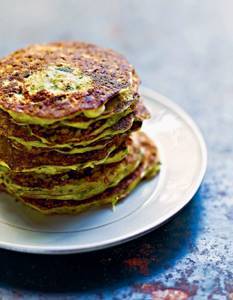
When preparing caviar from zucchini, a large amount of oil and additional products are always used, so it is no longer possible to call such a dish dietary. Its energy value is 97 Kcal. The stuffed vegetable has a calorie content of 105 kcal.
The calorie content of fried zucchini can also vary. If you use only flour for breading for cooking, the figure will be equal to 88 Kcal, and if you add mayonnaise, garlic or breading in lezone and breadcrumbs to the dish, then the energy value can double.
Zucchini fritters nutrition facts
Ingredients:
- Zucchini - 250 g;
- Flour - 2.5 tablespoons;
- Egg 1 - piece
- Vegetable oil - 20 ml
- Salt.
Cooking method:
Wash the zucchini well and peel off the skin with a knife.
Cut lengthwise, remove the inside, along with the seeds.
Scroll through a meat grinder, or take a medium grater and grate them.
Add eggs, salt, flour and mix everything thoroughly.
Heat the oil in a frying pan, spoon the zucchini mass into the pan, fry on both sides for 7 minutes.
Benefits for women
The main indicator of beauty for the fair sex is a slim figure, which can be achieved by including tasty and healthy zucchini dishes in your diet. By arranging fasting days with only zucchini dishes a couple of times a week, you can lose 4 kg in a month.
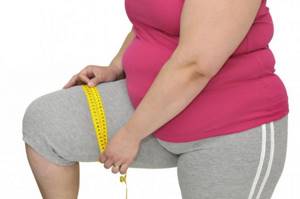
If you want to cleanse your body of toxins and lose weight in a short time, you can go on a strict zucchini diet, but only for 5 days.
During pregnancy, women are not prohibited from eating zucchini, but they should remember that the diet at this time should be rich in nutrients, which means that you should not abuse the low-calorie product. Experts recommend combining them with meat products for greater nutritional value. The benefits of zucchini at this time are enormous. They help relieve swelling and normalize stool, which is very important during pregnancy. During pregnancy, it is better to give preference to stewed dishes.
During lactation, eating zucchini is also not prohibited. The vegetable is neutral in taste and does not change the properties of breast milk. At this time, it is also better to give preference to stewed and boiled zucchini. This product should be used with caution only by nursing mothers who did not eat it during pregnancy.
Useful properties of zucchini
Since the lowest calorie zucchini product is raw zucchini. This means it is safe to eat. 100 grams of fresh zucchini contains 30% of the required vitamin C. We need vitamin C for skin elasticity. It helps build the skin framework and maintains the elasticity of blood vessels. Vitamin C deficiency also manifests itself in the form of bleeding gums. Zucchini contains substances such as lignins. They prevent the development of breast cancer and diseases such as scurvy. Of course, heat treatment destroys vitamin C and other beneficial substances. But it still remains a low-calorie product. If you don't add a lot of oil. But fried zucchini cannot be called a low-calorie product.
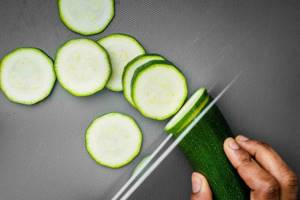
Use in cosmetology
The benefits of zucchini for the body are manifested not only when they are eaten. A face mask made from grated vegetables can brighten your face and even out its tone. To enhance the effect, you can use zucchini juice, pre-mixed with a couple of drops of hydrogen peroxide. The fabric is moistened with the composition and left on the face for 15-20 minutes.
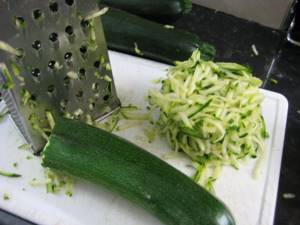
To soften rough skin on the feet, grind the zucchini pulp and apply it to the desired area of the feet and cover with film for half an hour. After this, the mask is removed, the feet are rinsed, cleaned with pumice and moisturized with cream.
You can also use zucchini to strengthen your hair. To do this, combine the grated vegetable with a similar amount of chopped onion, after which the mixture is applied to the roots of the hair and left there for half an hour. The mask is washed off with shampoo.
Why is zucchini good for those who are losing weight?
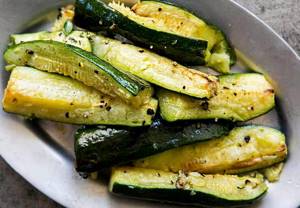
Zucchini is quite useful for those who are struggling with extra pounds. Firstly, it contains a lot of water. Secondly, these vegetables are famous for containing the most beneficial macroelements for us. Thirdly, they are low calorie. Fourthly, zucchini is low in fat and carbohydrate compounds.
Thanks to the zucchini liquid, our body absorbs it well and quickly. And magnesium contained in vegetables does not allow this liquid to linger in the body for a long time, since it has a diuretic effect.
Moreover, zucchini is a real storehouse of vitamin complexes and mineral compounds. Thanks to its rich and valuable composition, zucchini makes us healthier and stronger. And that's not it!
"Benefits" of zucchini:
- help restore water-salt balance;
- lower blood pressure levels;
- reduce harmful cholesterol levels;
- “expel” toxic and waste components from the body.
Harmful use
Despite the fact that zucchini has a very good and healthy composition, as well as low calorie content, it can still cause harm to the body. In particular, it should not be consumed by those who suffer from gastritis and stomach ulcers. It is also contraindicated for people with impaired kidney function, because potassium is poorly excreted from the body. Harm can also be caused by the fact that it contains a lot of fiber, because it is not processed by the body and can only leave the body as a food bolus.
Video
Product calculator
Enter the quantity of the product “Zucchini” to calculate its nutritional value
| Property | Meaning | % of normal | |
| Calorie content, kcal | 24 | 1.2 | 1.2% |
| Proteins, g | 0,6 | 0 | 0% |
| Carbohydrates, g | 4,6 | 1.6 | 1.6% |
| Fats, gr | 0,3 | 0 | 0% |
Calorie content
So, BJU of 100 grams of zucchini is:
| Kcal | 23 |
| Carbohydrates | 5.2 g |
| Fats | 300 mg |
| Squirrels | 600 mg |
True, we are talking about a raw vegetable. How many calories are in fried or baked zucchini, for example, must be calculated separately. It can vary from 17 to 24 calories. The glycemic index, if we take into account its raw form, is 15 units, and when fried this figure is five times higher.
In fact, the benefit lies not only in its low calorie content, but also in the fact that this vegetable has a very good chemical composition. It contains 93% water, and is also filled with fiber, organic acids, mineral salts, and vitamins. But even this is not the main thing, they are all in perfect balance with each other. And this is very beneficial for the body.
So, the product includes:
| Vitamins | Microelements | Macronutrients | The nutritional value |
| Vitamin C 15 mg | Iron 0.4 mg | Potassium 238 mg | Proteins 0.6 g |
| Vitamin H 0.4 mg | Calcium 15 mg | Carbohydrates 4.6 g | |
| Vitamin A 5 mcg | Phosphorus 12 mg | Fat 0.3 g | |
| Vitamin PP 0.6 mg | Sodium 2 mg | Water 93 g | |
| Vitamin B1 0.03 mg | Magnesium 9 mg | Fatty acidsSaturated 0.1 g | |
| Vitamin B2 0.03 mg | Fatty acidsUnsaturated0.1 g | ||
| Vitamin B5 0.1 mg | Dietary fiber 1 g | ||
| Vitamin B6 0.1 mg | Organic Acids 0.1 g | ||
| Vitamin B9 14 mcg | Ash 0.4 g | ||
| Vitamin E 0.1 mg | |||
| Beta-carotene 0.03 mg |
What vitamins do zucchini contain?
- Zucchini is popular due to its composition. It contains vitamins C, B2, B6, B9, K, A. Among the minerals, its components are manganese, magnesium, potassium, copper, calcium, phosphorus. The peel is filled with fiber, folic acid, and antioxidants.
- It has a positive effect on the formation of bones and muscles, thanks to calcium, which is well absorbed along with magnesium.
- Positively affects heart function and reduces blood pressure. The risk of strokes is reduced.
- Vitamin C has a beneficial effect on the immune system.
- Thanks to folic acid, vegetables have a beneficial effect on fetal development and reduce the risk of Alzheimer's disease.
- Potassium stimulates brain function and improves cell activity.
- Magnesium helps to avoid or quickly overcome depression, stress, and fills the body with strength.
- Vegetables improve vision, which deteriorates with age.
- If you cover your eyes with pieces of fresh zucchini, you can relieve redness and fatigue.
- High fiber levels and low glycemic index help you lose weight quickly.
- Vegetables promote collagen production, which improves skin condition.
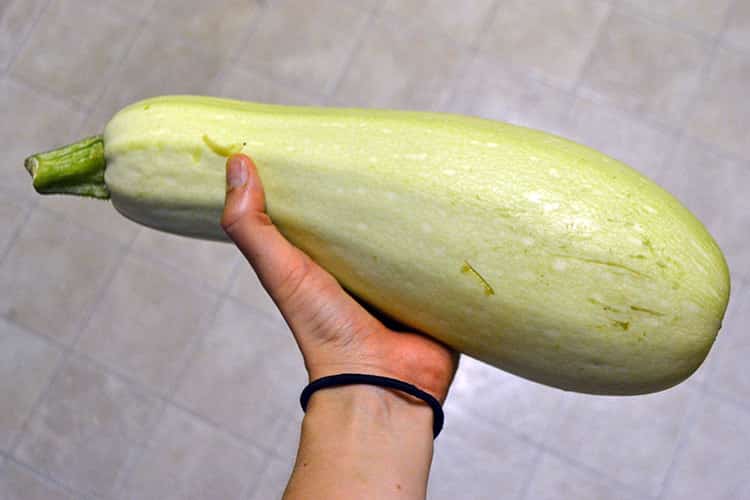
How to eat to lose weight: advice from nutritionists
Zucchini, especially in the summer-autumn period, have an affordable price and are not picky about storage. Due to its composition, it has a positive effect on digestion. Dietary fiber keeps you feeling full for a long time and does not cause allergies, which is why nutritionists recommend this food for many diets, especially for weight loss. There is even a special menu where the main ingredient is stewed or boiled zucchini. Fried ones are not suitable for such purposes.
The basic rule of the diet is to eat zucchini in different forms every day for several days. Also included in the menu are lean meats, fish, fermented milk products, other vegetables, fruits, and herbs.
Oatmeal and buckwheat are allowed from cereals. When choosing a balanced diet, this regimen can be followed for a long time. You need to drink up to 2 liters of water per day, the last meal should be no later than three hours before bedtime. The best helper will be physical activity - for example, visiting the gym.

